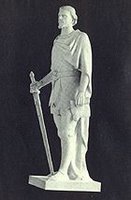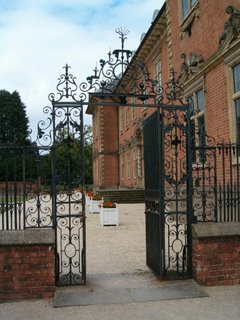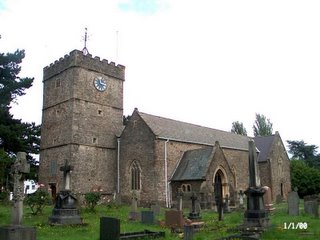
Llywelyn ap Morgan had lost Tredegar, but whereas such a cataclysmic state of affairs perhaps would have sunk a less durable dynasty, it proved to be merely a blip in the fortunes of the Morgans of Tredegar.
One weapon the Morgans wielded with skill throughout the centuries was marriage. Dynastic marriages managed to greatly expand the family's wealth and prestige in the years to come, but in those uncertain few years after the failure of Owain Glyndwr's revolt, it was a tactical match that saved the Morgan aspirations.
Llywelyn arranged a lucrative marriage between his eldest son Ieuan and Elizabeth, the daughter of Thomas ap Llywelyn of Brecknock, brother of that sworn enemy of Glyndwr, Dafydd Gam.
Dafydd Gam (or 'Dafydd of the Squint', a rather unfortunate nickname perhaps) had long supported the King and actively opposed Glyndwr's rebellion. A man of great personal courage he died at Agincourt fighting alongside Henry V, and some sources credit him as having saved the King's life that day. To bring Dafydd's niece into the Morgan fold was something of a masterstroke and it seems to have allayed any lingering suspicions the authorities may have had about rebellious intentions still emanating from Tredegar.
Assuming that the Morgans received their estates back soon after this marriage, Tredegar passed on to Ieuan (or 'Jevan' as he appears in some sources) who faced the task of re-establishing their local pre-eminence. Ieuan appears to have lived to a very old age, so long in fact, that the Victorian antiquary Thomas Wakeman explored claims that Ieuan had been present at the Battle of Bosworth Field in 1485. Since his father had come of age almost a century before that, it is unlikely that Richard III would have been shaking in his boots at the prospect of meeting this ancient Morgan on the field of battle.
Although, if Ieuan had been born relatively late, he could have been present at Bosworth in his late eighties, and although this seems rather implausible, it was not unknown for octagenarians to participate, and participate valiantly, in battle at the time.
If Ieuan was still alive at the time of Bosworth it seems more likely that he would have declared his support for the Tudor cause but left the actual fighting to his son, Sir John.
When Ieuan eventually died is not known but, perhaps some time after the Tudor dynasty began their reign on the throne of England, he, as Thomas Wakeman concluded: "probably retired to Tredegar and died in his bed."
Married: Elizabeth, daughter of Thomas ap Llywelyn
Children:
Sir John Morgan
David
Jenkin born c1454


